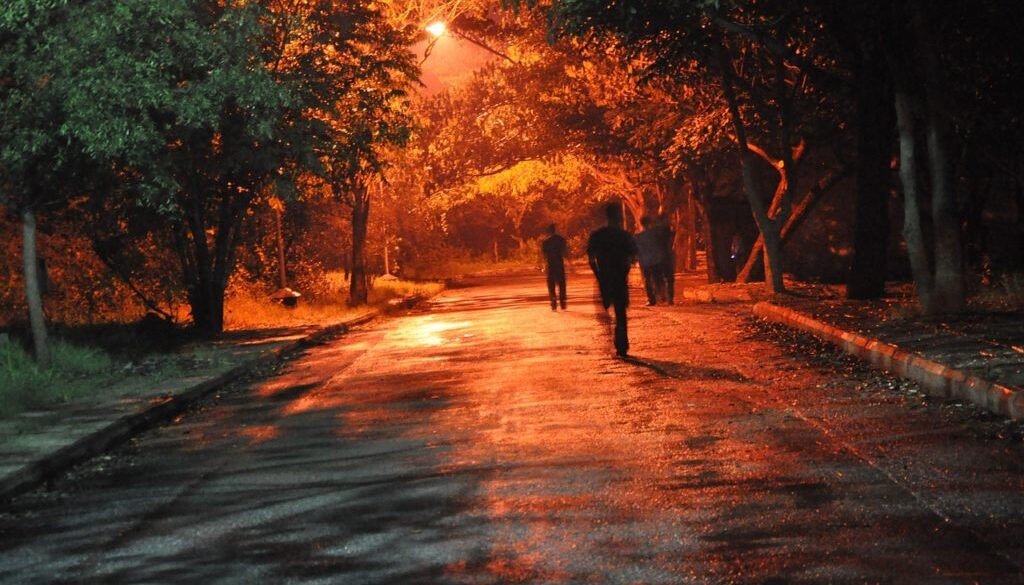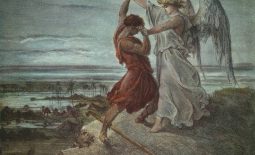Not All Who Wander Are Lost
By Rabbi Esther Hugenholtz
‘Vayomer Adonai el Avram lech lecha m’artz’cha umimolad’t’cha umibeit avicha el ha’aretz asher ar’echa… veyehey b’racha’.
‘And the Eternal said to Avram, go from yourself, from your homeland, the place of your birth, and your father’s house to a land that I will show you… and you shall be a blessing.’
Last night, I spoke about this beginning of blessing, of how we are framing the High Holidays around this verse from the Torah and explore it. We are going to read that verse and sit with it, savor it, live with it and make it our own.
What does it mean to go ‘from yourself, from your homeland, the place of your birth and your father’s house?’ Surely, the Torah could have sufficed in saying ‘lech m’artz’cha el ha’aretz asher ar’echa’ – ‘go from your land to the land that I will show you.’ We normally assume that the Torah’s language is efficient and focused, so if the Torah uses a more expanded syntax, it means we are called to read the text very closely. In fact, we are going to read it so closely that we are going to only look at ‘lech lecha’.
That’s right: this is a sermon about two words. Two words.
The Jewish Publication Society edition of the Torah, to my chagrin, doesn’t even bother translating ‘lech lecha’. It jumps straight to the next word in the clause: ‘go forth from your native land…’ Yet the lecha is unequivocally there which we can translate as ‘go from yourself’ or ‘go into yourself’ and both translations are compelling.
World-renown Bible Scholar Aviva Gottlieb Zornberg sketched out Abraham’s character and destiny in her book ‘The Beginning of Desire: Reflections on Genesis’. She writes:
“Here begins the journey of lech lecha – with its strange order of abandonments – first land, then community and, finally, father’s house. For the first time, a journey is undertaken not as an act of exile and diminution… but as a response to a divine imperative that articulates and emphasizes displacement as its crucial experience.”
Gottlieb Zornberg examines the psychology of Abraham’s predicament. He leaves Ur Kasdim, the place of his origins, but isn’t exiled – he is called by God. And not only that: his experience of ‘uprootedness’ and ‘foreignness’ is the key to his spiritual and emotional transformation. If Abraham would not have been called to leave all that was familiar to him, to become the ‘boundary-crosser’, would he have been the first Jew?
Our scholar continues:
“The imperative of transformation is the driving force of lech lecha. To leave one’s place is ultimately to seek to become other. Makom – place -…indicates not only physical space, but existential condition… The promise/demand of God is “I will make of you a great nation,” which the Tanchuma translates, “I shall create you anew.” In this reading, the call of lech lecha is an urging to self-transformation…”
In short, Abraham didn’t just get up and leave because he wanted a new project or a new adventure. He wasn’t a globetrotter who had signed up for an AirBnB in Canaan! This was a journey of the soul – just like the journey all of us are expected to engage in for the next ten days; we are sojourners of a different kind – called to draw closer to ourselves, each other and God.
‘Lech lecha’ – go from yourself; go into yourself. Ask yourself this question: where do you want to go these High Holidays? In your life? Where are you called to? What, dear friends, is our purpose and mission?
Rabbi Yehudah Leib Alter of Ger was a Polish Chassidic master from Ger (or Gur) who lived, worked and taught in the late 19th and early 20th century. He is primarily known by the title of his foremost work, a mystical Torah commentary called ‘Sfat Emet’, ‘the Language of Truth’. His approach to the texts of our tradition is to read the meaning of our lives and the calling of our souls back into the text. He uses the stories of the Torah as a template to explore the human condition. The Abraham who the Sfat Emet describes isn’t just a historical character or a narrative devise but an existential archetype that applies to each and every one of us. He writes:
“Now surely each person was created for a particular purpose. There must be something that we are to set right… This is complete surrender referred to in the verse “Get you from your land, your birthplace, and your father’s house.” In this way we attain a new enlightenment as did Abraham our Father… A person is essentially set aright when he forgets the vanities of this world—“forget your people”—and remembers that he is sent into this world to do God’s bidding.”
The Sfat Emet is exhorting us to keep on moving. As the Kingstoner Rebbe sang (aka Jamaican reggae artist Bob Marley), ‘we know where we’re going, we know where we’re from.’ We are called to be wanderers and sojourners in our lives, to go from place to place, even and especially if we do not know the destination. This is the leitmotif for the Jewish condition. As J.R.R. Tolkien wrote in his ‘Lord of the Rings’: ‘not all who wander are lost.’
Lech lecha – go from yourself, go into yourself.
Both translations seem paradoxical, or even mutually exclusive. But we can only go into ourselves if we transcend the limitations of self. We come here, in the peacefulness of this moment to do that very thing. To go from ourselves: to leave behind our petty grievances, our hurts, our fears, the things that tie us to anger, to judgment, to prejudice, to toxic habits and harmful self-perceptions. We participate in this pageantry of the soul that we may or may not fully understand. We may or may not fully believe in this pageantry yet somehow, we feel called. And so we sit here with our complex emotions, our ambivalences, our vulnerabilities, our childhood memories (or traumas) and our future hopes and expectations. We let the High Holidays wash over us; its melodies, its words, its messages. Go from yourself, remain dynamic and open to change. We are called to t’shuvah, to redemption.
To quote the Sfat Emet one more time:
“‘Get out of your land’—a person should always keep walking. ‘to that I will show you’—always some new attainment. This is why the person is called a walker. Whoever stands still is not renewed, for nature holds him fast. The angels above are beyond nature; they can be said to stand. But the person has to keep walking.’”
Where do we hope to walk to in our lives? Even though we cannot see our destiny, we do not need to start this journey with an unseeing heart. We prepare our hearts, transform them from hearts of stone into hearts of flesh.
In Japanese wisdom exists the concept of ‘Ikigai’, which translates as ‘A Reason for Being’. Like the intersecting petals of a flower, Ikigai can be presented as an existential Venn diagram where passion, vocation, profession and mission intersect to form ‘Ikigai’ – ‘reason for being’. Radiating outwards in a secondary layer of overlapping petals are four other categories for us to consider: what we love, what we are good at, what we can be paid for and what the world needs. Perhaps Abraham our Father and Sarah our Mother intuited that their Ikigai resided beyond the boundaries of Ur Kasdim, on the road to Charan and Canaan, but ultimately in themselves. Being charged to find our own ‘reason for being’ is hard and scary. It’s supposed to be.
The High Holiday season make both an extraordinary claim and demand. The claim is as bold today as it was thousands of years ago: we can change. We can live for something greater. We can find love. We can atone and attain forgiveness. We can uncover our purpose. We can embrace meaning. We can express our personal mission. We can serve God more deeply and bring our questioning, vulnerability and hope to the Holy One of Blessing. The heroism of Abraham and Sarah is not just that they were wanderers from place to place by the mere accident of circumstance. Their heroism lay in their willingness to fundamentally uproot themselves and to ask themselves that core question: where am I sent to and why?
There is incredible bravery in that vulnerability; bravery that our culture is quick to dismiss. Abraham and Sarah left behind a culture that was failing them; that wasn’t fostering, as the Midrash says, his critical thinking skills that allowed him to deduce the existence of a singer Creator. The land of his birth was a culture mired in pagan superstition – it was a place that was holding them back, stunting their growth as people and compromising their ethical values. Uprootedness was the answer to that challenge.
What if we can wander like Abraham?
Turn our ambivalence into questioning.
Our questioning into curiosity.
Our curiosity into transformation.
Our transformation into motivation.
Our motivation into mission.
‘To a land that I will show you’ implies a level of trust bordering on madness. And yet, many of us know from moments great and small that in these spaces of our lives is where the growth happens.
This time, I’m not going to quote a Bible scholar or a Chassidic Rebbe, but, controversially perhaps, a pastor. Pastor Rick Warren from the highly successful Saddleback Church is a Los Angeles-based Evangelical pastor who is a friend of Dr. Ron Wolfson, one of contemporary Judaism’s premier educators (and writer of the best-selling book ‘Relational Judaism: Using the Power of Relationships to Transform the Jewish Community’). Pastor Rick has occasionally taught sessions at the Ziegler School of Rabbinic Studies in Los Angeles, where I studied also and many rabbis secretly read his books to glean inspiration from his passion and methodology, crossing the barriers of faith, culture and theology.
Perhaps the most successful book written by Pastor Rick Warren is ‘The Purpose Driven Life: What on Earth Am I Here For?’ which sold over 34 million copies. (And while we are at the numbers game: his church has 30,000 members – a size that we Jews have no way of imagining!)
It’s not about you
The premise of ‘The Purpose Driven Life’ is that it is a 40-day ‘spiritual course’ in the best of the Evangelical tradition, to help one uncover the purpose of your life in light of one’s Christian faith (that number forty resonates so much with our tradition of course, not least because it is the period from Elul to Yom Kippur). For obvious reasons, some of his teaching in this book is non-transferrable to our tradition (and even in direct conflict with it) and that’s OK. But much of it is. With laser-sharp focus, the author identifies what the story of Abraham identified 3500 years ago: that we need to be driven by purpose because if we are not, we are driven by something else: our impulses. He identifies five things that people are commonly driven by: guilt, anger, fear, materialism and the need for approval. Using scriptural texts as the basis of his teaching, he identifies how purpose can reframe our lives through meaning, simplicity, focus, motivation and what he calls ‘eternity’. The last one is where Jewish theology and Evangelical theology, with its emphasis on the afterlife, part ways so perhaps I would reframe it as ‘an eternal perspective’ instead. Even so, to build on Rick Warren’s terminology, we can come to our own mission-driven Judaism.
He opens his book with a bold claim:
“It’s not about you”. The purpose of your life is far greater than your own personal fulfillment, your peace of mind, or even your happiness. It’s far greater than your family, your career, or even your wildest dreams and ambitions. If you want to know why you were placed on this planet, you must begin with God.”
In case any of us is feeling supremely uncomfortable with this, I’d say with no uncertain amount of chutzpah (as well as a great deal of love): good! These ideas are completely in resonance with our High Holiday liturgy as this is part of the work of t’shuvah. Lech lecha: go from yourself/go into yourself – embrace the paradox of doing the inner work that allows us to transcend the self and fit ourselves into a Greater Whole.
‘Uv’shofar gadol yitaka vkol dmama daka yishama’ the Musaf service teaches us during the Unetaneh Tokef, ‘The great Shofar is sounded; a still small voice is heard.’ The passage continues:
‘Adam yesodo m’afar v’sofo l’afar’ – ‘Our origin is dust and our end is dust.’ It’s not about you.
‘Benafsho yavi lachmo.’ – ‘At the hazard of our life we earn our bread’ The purpose of your life is far greater than your family, your career or even your wildest dreams and ambitions.
‘Mashul kecheres hanishbar.’ – ‘We are like a fragile vessel, like the grass that withers, the flower that fades, the shadow that passes, the cloud that vanishes, the wind that blows, the dust that floats, the dream that flies away.’ Here it is: the perspective of our vulnerability, our mortality, our temporality.
‘V’Atah Hu Melech el chai v’kayam’ – ‘But You, Sovereign of All, are the living and everlasting God.’
If you want to know why you were placed on this planet, you must begin with God. And in order to begin with God, you must first go into yourself and go from yourself. You must ‘lech lecha’ or ‘lechi lach’. As I addressed in my Rosh haShanah sermon last year, about surrender and the Great Aleinu, we are called to surrender. Only then can we undertake the journey.
The High Holidays are the incubator for our new thoughts and experiences, the crucible where our discomfort can be alchemized into growth and a deeper knowing. In this summoning of the soul during the High Holidays, we are charged to uncover that very same thing. ‘Veyehey B’rachah’.
Wishing us a becoming of blessings on our journey.




